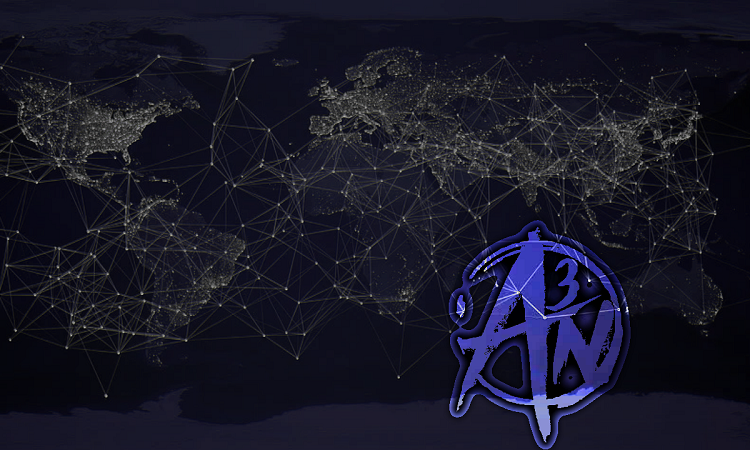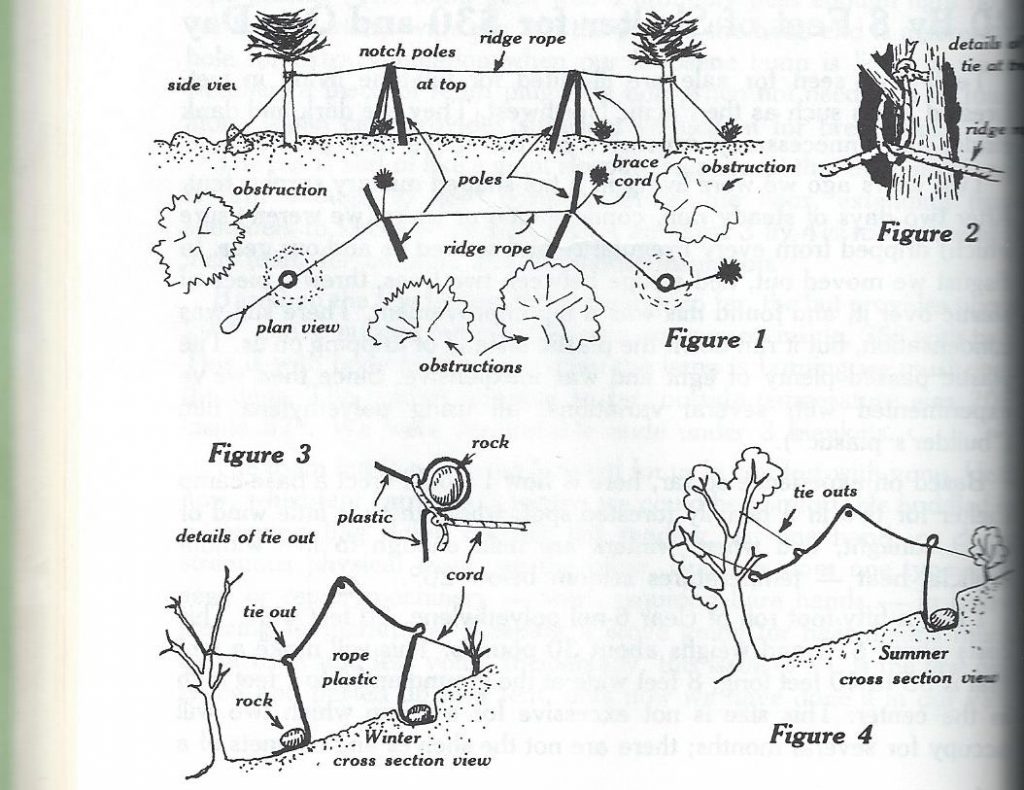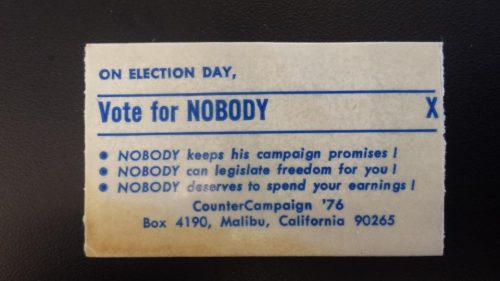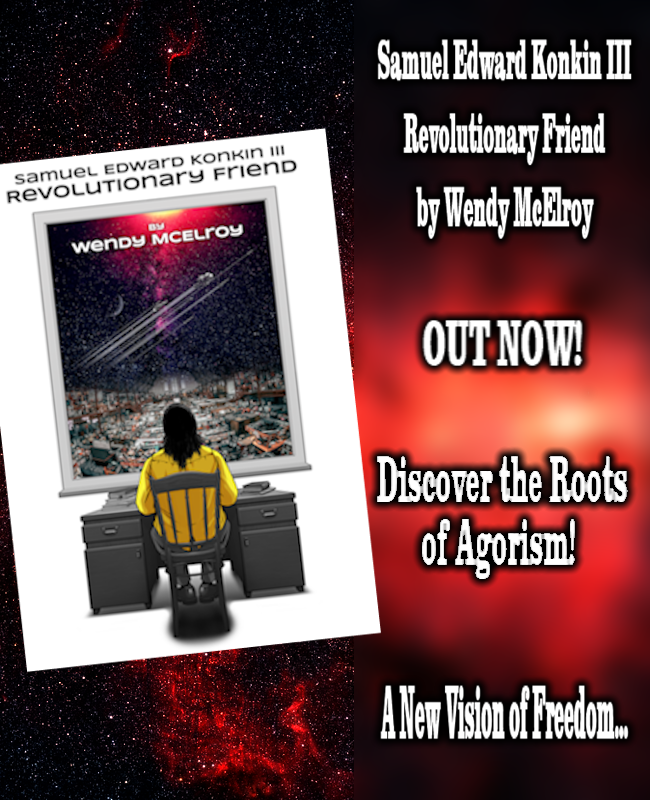
Ethical Enclave Trading: A Precursor To Agorism [And Konkin’s Views of Rayo/Vonu]
Ethical Enclave Trading: A Precursor To Agorism [And Konkin’s Views of Rayo/Vonu]
[Author’s Note: Four articles by Samuel Konkin will be referenced in this article. Click here to view them. Get Rayo’s book for FREE in PDF/audiobook format HERE!]
If you happened to be a libertarian/anarchist in the 1960s and 70s, southern California was the place to be. This bustling community was home to many ideological figures who largely developed the theory, and practice, of modern libertarian & anarchist thought.
Two self-liberators, specifically Rayo (a.k.a El Rayo, Tom Marshall) and Samuel Konkin III (SEK3), also called this place home for at least some time, although they never crossed paths. Rayo is lesser-known for his development of vonu, and SEK3 is now well-known for his strategy called agorism, probably the most popular anarchic school-of-thought.

Vonu, simply defined, is the condition or quality of, as well as the action of achieving, an invulnerability to coercion. Etymologically, it is an awkward contraction of the phrase, VOluntary Not vUlnerable (hence, “vonu”), and practically, it’s the adoption of lifestyle changes in pursuance of said invulnerability to coercion. These lifestyle changes include, but are not limited to: *Ethical enclave trading (the precursor to agorism, more below), *Off-grid homesteading, *Van nomadism, *Crypto-anarchy, *Perpetual traveling/strategic relocation, *Entrepreneurship/financially-independent early retirement, *Wilderness vonu, *Vonu in cities, and more.
~~~
GRAMMATICAL VARIATIONS OF “VONU” DEFINED
Vonu: the condition or quality of, as well as the action of achieving, an invulnerability to coercion.
Vonuer: having comparatively more an invulnerability to coercion.
Vonuence: in the process of achieving an invulnerability to coercion.
Vonuan: one who has an invulnerability to coercion.
Vonuist: one who advocates for an invulnerability to coercion.
Vonuism: the advocacy of an invulnerability to coercion.
Vonuum: the place or situation of an invulnerability to coercion.
Vonumy: the art of achieving an invulnerability to coercion.
Vonumer: one skilled at an invulnerability to coercion.
~~~
Agorism, on the other hand, is a market anarchist strategy whose goal is the eventual abolition of the State by way of counter-economics, or trading in black and grey markets. These “trafficked” products and services are either illegal or unregulated and untaxed, but not immoral or unethical. The end (and intermediate) achievement is the agora, the sum of all voluntary human interaction. To put it another way, vonu is defensive, whereas agorism is offensive; much like a duality, they could be used together to mutually reinforce each other.
KONKIN & RAYO: MORE ALIKE THAN NOT
Before diving into what SEK3 had to say about Rayo and vonu specifically, let’s first compare and contrast these two freedom pioneers.
First, both were wholly apolitical, even outright anti-political.
Rayo chose to not participate in politics, and even went so far as to coin the terms “political crusading” and “bullshit libertarianism.” Politics by its very nature is collective, which Rayo had a term for too: “collective movementism.” From his other idea of “controlled schizophrenia” found in his book, it’s safe to conclude that he would clump the political crusaders under that label as well.
~~~
VONU VOCABULARY
Political Crusading: a strategy to restore liberty by working inside of the system in order to change it from within. Examples of this are petitioning, writing to congressmen, protesting, grassroots lobbying, running for public office, and voting. Synonyms include reformism and bullshit libertarianism.
Collective Movementism: an aggregate set of behaviors and actions that are aimed towards large-scale socio-political change in the furtherance of specific goals. Examples include the environmentalist movement, the alt-right, the labor movement, the Libertarian movement, the public lands movement, the anti-war movement, the gay rights movement, the women’s’ rights movement, and the civil rights movement.
Bullshit Libertarianism: another word for collective movementism, whereby one’s freedom/liberation is dependent upon others to join them.
Controlled Schizophrenia: the mental state of an opportunistic citizen-serf within the servile society who practices doublethink, yet who still acts in his own best interest. Political crusaders are but just one example of this in action.
~~~
Likewise, SEK3 was against political crusading, as he viewed it as an inconsistent application of means and ends. In New Libertarian Manifesto, he said:
“Worst of all is Partyarchy, the anti-concept of pursuing libertarian ends through statist means, especially political parties.” (p. 7)
As far as why they both opposed this anti-strategy, they were very much in line.
Secondly, they were both freedom pioneers and developers of strategies that were outside of the political sphere. They differed in approach, but we’ll get to that in a moment.
The last important commonality, as well as the main subject of this article, is that they both saw the advantages of trading in the black and grey markets.
In November 1965, when SEK3 would have been a mere 18 years old, Rayo published an article in Innovator titled, “Self-Seeking: Ethical Enclave (Black Markets).” He defined this concept as:
“An ethical enclave is defined here as voluntary transactions between individuals who are living under a collectivist government, when such transactions are conducted independent of that government. ‘Ethical’ denotes the distinguishing characteristic of the participating individuals: an adherence to the ethical principle of voluntarism…And ‘enclave’ denotes physical emersion within a philosophically alien society.”
Sounds awfully similar to agorism, right? From the aforementioned 1965 article, Rayo continues:
“An ethical enclave, by existing within the territorial domain of a coercive government is either legal – utilizing ‘interstices’ in the taxes and regulations of that government, or illegal – operating despite threats of violence.”
Here, Rayo is indeed describing the black and grey markets of agorism – either trading in goods and services that aren’t illegal, or dealing in outright contraband. But he doesn’t stop there…what are the differences between ethical enclave entrepreneurs and black market operators? He says that “the differences are significant.”
“The mixed premise ‘black market’ operator, while violating socialist laws, still holds (at least subconsciously) some of the premises embodied in laws. He may experience a depressing sense of guilt; he may act with the handicap of psychological conflicts. The enclave entrepreneur, however, disavows not only the particular instance of initiated violence but the collectivist morality as well. He experiences an exhilarating sense of righteousness; he acts with the confidence and certitude of psychological consistency.
The enclave entrepreneur, furthermore, is dealing not only with immoral (by their own definition) ‘criminals’ but with producers – with moral individuals who are committed on principle to hold confidences and honor contracts. His ‘costs of doing business’ therefore tend to be less.”
In other words, he’s calling your typical black market operator a controlled schizophrenic (see definition above). Alternatively, the ethical enclave operator has “an exhilarating sense of righteousness,” as he recognizes the attempted violations of his autonomy, and his act of rebellion in restoring it.
Furthermore, he discusses the significance of dealing peer-to-peer with like-minded individuals. Thankfully, this is the direction things have been going for about 20 years with open-source technology. Rayo was just, as always, way ahead of the curve.
Recall the agorist notion of “starve the State, then smash it.” Even though ethical enclaves are: 1) just an option for vonuans, not a requirement, and 2) small-scale focused with no goal of abolition, Rayo still believed black and grey market trading could be a thorn in the State’s side:
“Ethical enclave trading profits participating individuals and promotes liberty in general by reducing the plunder available to the collectivist government – plunder which would most probably be used to finance further violations of liberty, plus propaganda to rationalize the violations. The potential effect of ethical enclave trading should not be underestimated. Mixed socialist government direct most of their extortions and regulations at trade – they tax primarily income and sales. But a transaction can easily be taxed only with the cooperation of at least one party to the transaction. Large scale non-cooperation would render income and sales taxes ineffective and greatly reduce government revenues – an ultimate check on a State’s capability for violence against its subjects.
An ethical enclave would also encourage growth of a ‘libertarian movement’ by adding self-interest motivations.” [Emphasis added]
Looking back with the benefit of hindsight, thanks to the fiat money printer, I personally don’t believe agorism will succeed in its more “revolutionary” objective of starving the State economically, but I do of course see the strategy of incredible value in self-liberation, whether for an individual seeking financial independence (by reducing costs or increasing opportunities), or just fulfilling the need/desire to live one’s principles in the here-and-now – this tweet from James True is but one demonstration of this.

THE PATHS DIVERGE
So, then, where did these two individuals differ?
To start with ideology first, Rayo was not an anarchist—unfortunately, as we discovered in one of his articles, he incorrectly saw all anarchists as folks who use retaliatory force against the rulers. From other articles, we also learned that the individuals in the Free Isles Project agreed upon a nominal State. Personally, I don’t hold this against Rayo, as the proliferation of free market anarchist-oriented thought was definitely not as widespread as today. That, and his actions and views on strategy are far more relevant and important.
Konkin, on the other hand, was an openly-avowed anarchist—nothing else needs to be said on that note. He had a burning desire to see the end of the State and developed a philosophy/strategy based upon it.
Next, they differed in strategy—Rayo’s interfacing with the public was in the form of newsletters and other such publications, as well as a few small “Vonu Weeks” for individuals looking to develop their liberated lifestyle capabilities; but as can be ascertained from his book, he didn’t have a whole lot of patience for folks and was more of a hermit.
SEK3 was a quite a bit different though—not only did he openly admit that he didn’t pay taxes in a debate with Robert Poole, but he had much more of a public presence—he spoke at conferences, wrote books, and pursued culture jamming efforts, such as the CounterCampaign ’76.
It’s safe to say that these two individuals’ approaches varied drastically on this point.
Lastly, Rayo saw mobility as being crucial. He lived as a “van nomad” for a while, and then pursued wilderness vonu, both methods containing the option to pick up and leave quickly. He also discussed country shopping and minimalist sailboating, which are more evocative of Temporary Autonomous Zones, rather than a fixed geographical locale. He did discuss prospects of more advanced, more permanent levels of vonu, such as small and heavy industry, but to my knowledge, never pursued them.

[Diagram of Rayo’s vonu shelter from his book, Vonu: The Search for Personal Freedom – read, download, or get the paperback.]
SEK3 was different—as we will get to momentarily, he had some disparaging things to say about vonuists. In one article, he wrote, “As for me, anarchy begins at home.”
His goal was to recruit individuals to practice in the counter-economy, and he felt like that was best done through face-to-face discussions and conferences. He also believed that doing so in a permanent (or semi-permanent) location was most efficacious, rather than living as a nomad or “retreating,” as he would put it.
All of that said, I’d like to tie up one loose end before moving forward. In passing, I mentioned and defined Rayo’s concept known as ethical enclaves, which is strikingly similar to that of SEK3’s agorism. I initially posited in Vonu Podcast #1: An Introduction to Vonu that it is reasonable to believe Rayo had some sort of an impact on SEK3’s formulation of agorism. That said, the day of recording the episode, there was no “hard evidence” of that, let alone any evidence that SEK3 was even aware of this pseudonymous individual named Rayo.
I got a wild hair and decided to scour the “interwebs” for any possible connection—aha! There they were. From January-June 1975, SEK3 published four articles in the Southern Libertarian Review, mostly in the vein of now-libertarian history, as well as some details on the formation of the anti-libertarian “Libertarian” Party, all referencing Rayo and/or vonu specifically.
1) In his article titled, “Anarchozionism,” he discusses the earlier referenced Free Isles Project and goes into some detail about how it came about. SEK3 said:
“The Preform crowd either Browned out or went into escapist trips such as becoming nomads, troglodytes, or wilderness dwellers. They sought ‘invulnerability to coercion’—or vonu—and PREFORM-INFORM became Vonulife. Recently it sputtered to a halt, and the paranoia freaks drifted back to civilization.”
From that, we can gather that SEK3 was familiar with the vonuans and their goals, likely from the publications themselves. As can be seen, his perception of them was quite gloomy to say the least.
2) He published another article in March 1975 titled, “Carrots And Sticks,” wherein he highlights the achievements of various individuals he’s fond of and recommends. He gets to a portion of folks that he is not so familiar with:
“Before I leave Southern Calif., let me not slight anyone, but simply affirm that there are many libertarians I know well enough to exalt but who have not the general fame for their less persistent endeavors (generally due to working for a living, an affliction found rarely on the E. Coast). And there are others of fame that do not enjoy my personal knowledge, such as Joe Galambos, Natallee Hall and Skye D’Aureous, El Rayo and Naomi Gatherer, and Lou Rollins, whose good and worthy efforts will someday earn them a more adept chronicler.”
At The Vonu Podcast, our conception of Rayo during the 1960s and 70s is that he was not very well-known—it seems like he was part of an extremely niche crowd, and, if he enjoyed fame, it was not by the popular definition. In my written interview with Jim Stumm, the man who met Rayo back in 1971 (and chronicler/archivist of libertarian & vonu zines), his impression is that:
“…‘solutions-oriented’ lbtns [libertarians] were only ever a small minority among lbtns. Most lbtns were political, or armchair theorists living conventional lifestyles. I don’t know what the circulation of PREFORM or VONU LIFE was, but it was probably never more than 100s.”
That being said, the way SEK3 phrases that last portion is interesting: is it possible that Rayo was more popular than we originally assumed? Were (or are) there more vonuans than we assumed there to be?.
3) For those who are deeply interested in libertarian history, SEK3’s article, “Libertarian Strategy (1),” may be of interest to you. Herein, there are two different mentions of vonu, specifically publications. Here’s what he had to say:
“So that we are not condemned to relive it, let’s review our history. As of December, 1968, libertarian strategy was directed either toward influence of the conservatives or conversion of the independents. It was wholly educational or retreatist. Robert LeFevre’s Rampart College, Leonard Read’s FEE, Joe Galambos’ FEI, Nathaniel Branden’s NBI, F. A. Harper’s IHS, and Frank Chodorov’s ISI were all educational institutes. The VonuLifers, Atlantis group, and Oliverites were seeking escape. Except for the LIBERAL INNOVATOR’s leafletting of the Cow Palace in 1964, no libertarians were involved in a political campaign except as deviationist individuals. Many supported Nixon in 1968, but they were clearly of conservative leanings.”
…
“Many libertarians also turned inward with incessant psychology sessions and in-group self-criticism. This was the Movement as reflected in 1972 in, say, NEW LIBERTARIAN NOTES, and which could be pieced together from RAP, LIBERTARIAN FORUM, REASON, ACADEMIC ASSOCIATES LETTER, VONULIFE, FREEMAN, SIL NEWS, PACIFIC LIBERTARIAN, and many local newsletters. “
Regarding the first quote, SEK3 is quite accurate in stating that VonuLifers were seeking escape. Although, Rayo does discuss vonu in cities, he notes that, “I know of quite a few vonuists and libertarians who live [Allen] Humble’s way, but I know none who seem to like it for very long.” This is mainly due to the city psychological pressures of the statist-servile society, which is why he prefers “to live far enough back in the woods.” Other than that minor point, SEK3 is correct.
The second excerpt is particularly interesting, though. Unfortunately, the only VONULIFE articles I have read are those found within Rayo’s book, as well as the handful or so I’ve been able to digitize thus far (unfortunately not released yet). From those sources, I certainly don’t gather the “incessant psychology sessions” or “in-group self-criticism.” Rather, from the entirety of the book, it mainly consists of back-and-forth discussions on strategy, much like a forum or an Agorist Nexus comment thread.
I’m not sure what SEK3 was referring to here, but it’s definitely possible that he’s correct—until we acquire a library of those publications, we’ll just have to take his word for it.

4) This last article discusses CounterCampaign ’76, which was a culture jamming effort encouraging people to “Vote for Nobody!” Sarcastically, SEK3 writes:
“And who could we all agree on without sacrificing our principles? Behind whom could students of Murray Rothbard, Robert LeFevre, Ayn Rand, Leonard Read, Joseph Galambos, Karl Hess, Robert A. Heinlein, El Rayo, Natallee Hall, and Harry Browne unite? Nobody.”
On a slight tangent, it’s quite incredible to see Rayo’s name alongside Rothbard, Rand’s and Hess’. SEK3 is definitely right though—sure, a similar foundation of principles was adhered to by most of these folks, but the minor differences weren’t as minor as would be perceived by the casual statist, normie observer. The only solution is NOBODY!
So, what’s the takeaway?
- SEK3 was familiar with Rayo, even if only through the various publications they both read/contributed to;
- Agorism was likely developed based upon Rayo’s formulation of ethical enclaves;
- They differed in strategy, and were both particularly harsh towards those they disagreed with—that said, they were more alike than not;
- The history of libertarianism (even within the last 40 years) is chockful of fascinating details.
In closing, I believe that vonu and agorism go hand-in-hand, and offer an extremely powerful solution to the institutionalized coercion brought about by the State, as well as the non-institutionalized coercion brought about by those private coercers.
Hell, Rayo even included ethical enclaves (trading in the black/grey markets) as a potential option for vonuans, but more so in pursuing financial independence and tax minimization, rather than the more “revolutionary” agorism set out by SEK3 as a means of abolishing the State; because, remember, vonuans are more than happy to “co-exist” in protracted conflict with the State.
Sure, there are differences, but “we” are all individuals—that is the beauty of vonu—it is truly yours for the making.







